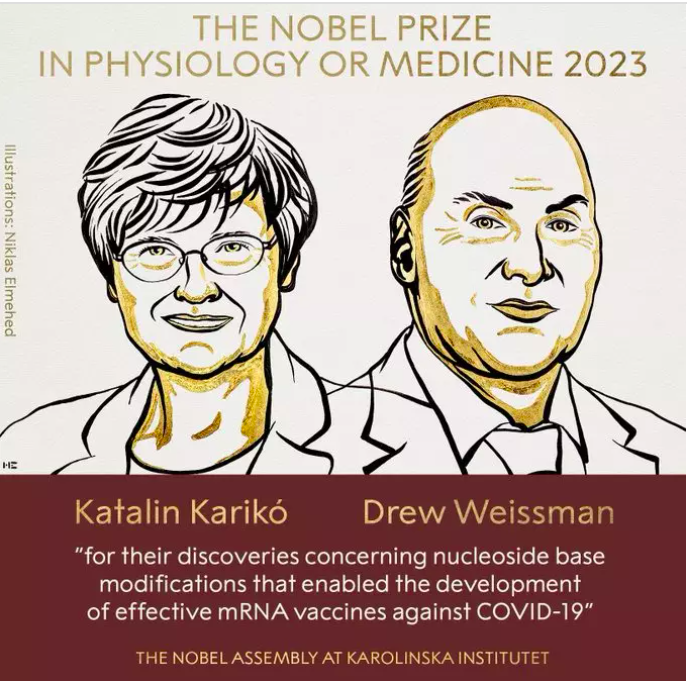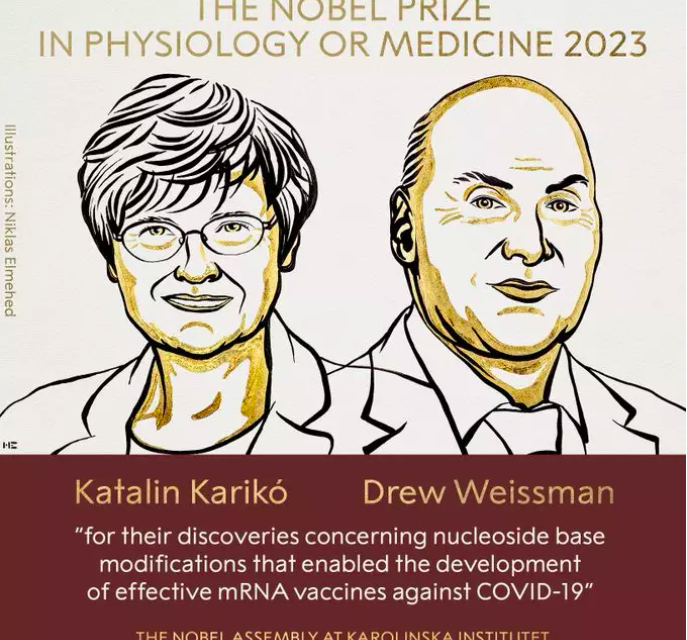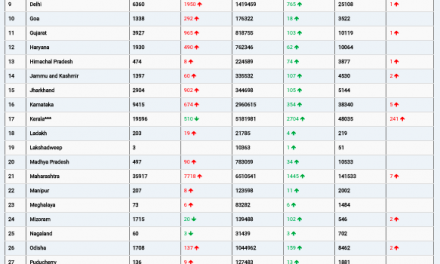
The Nobel Laureates’ breakthroughs were pivotal in the development of highly effective mRNA vaccines against COVID-19 in the early stages of the pandemic in 2020. Their revolutionary findings revolutionized our comprehension of how mRNA interacts with our immune system, playing a crucial role in the rapid creation of vaccines during a critical period in modern healthcare.
Before the pandemic, vaccines were primarily based on either weakened or inactivated viruses, such as those for polio, measles, and yellow fever. The 1951 Nobel Prize in Physiology or Medicine awarded to Max Theiler recognized his work on the yellow fever vaccine. More recent advances in molecular biology have led to vaccines targeting specific viral components or using carrier viruses (vectors), like those for hepatitis B and human papillomavirus, as well as Ebola.
However, producing these conventional vaccines requires large-scale cell culture, limiting their swift production in response to outbreaks. Hence, scientists have sought alternatives that are not reliant on cell culture. This is where mRNA technology emerged as a promising idea.
In the 1980s, in vitro transcription methods were introduced, allowing the production of mRNA without cell culture. This development was a significant leap forward in molecular biology applications. Despite initial challenges related to stability and delivery, researchers like Katalin Karikó and Drew Weissman persevered in their pursuit of mRNA-based therapies.
Collaborating at the University of Pennsylvania, Karikó and Weissman discovered that dendritic cells treated with in vitro transcribed mRNA elicited an inflammatory response. They identified that chemical modifications in the bases of mRNA from mammalian cells were absent in in vitro transcribed RNA, which triggered this immune reaction. Introducing these base modifications significantly reduced inflammation and increased protein production, a key breakthrough in enabling clinical applications of mRNA.
By 2010, interest in mRNA technology had gained momentum, leading to the development of nucleoside base-modified mRNA vaccines against Zika and MERS-CoV. When the COVID-19 pandemic hit, two such vaccines targeting the SARS-CoV-2 surface protein were swiftly developed and approved in December 2020, showcasing an impressive 95% effectiveness.
The agility and adaptability of mRNA vaccine technology offer promising prospects for combating various infectious diseases. Furthermore, this platform may hold potential for delivering therapeutic proteins and treating certain types of cancer. With over 13 billion COVID-19 vaccine doses administered worldwide, the impact of these vaccines in saving lives and curbing the severity of the disease cannot be overstated. The Nobel laureates’ foundational work on base modifications in mRNA played a crucial role in this transformative development during one of the most significant health crises in recent history.

Katalin Karikó, born in Szolnok, Hungary in 1955, earned her PhD from the University of Szeged in 1982. She pursued postdoctoral research at the Hungarian Academy of Sciences in Szeged until 1985. Following this, she continued her postdoctoral work at Temple University in Philadelphia, and later at the University of Health Science in Bethesda. In 1989, she assumed the role of Assistant Professor at the University of Pennsylvania, where she remained until 2013. Subsequently, she held positions as vice president and later senior vice president at BioNTech RNA Pharmaceuticals. Since 2021, she has served as a Professor at Szeged University and holds the title of Adjunct Professor at the Perelman School of Medicine at the University of Pennsylvania.

Drew Weissman, born in Lexington, Massachusetts, USA in 1959, obtained his MD and PhD degrees from Boston University in 1987. He completed his clinical training at Beth Israel Deaconess Medical Center at Harvard Medical School and pursued postdoctoral research at the National Institutes of Health. In 1997, Weissman founded his research group at the Perelman School of Medicine at the University of Pennsylvania. He currently holds the position of Roberts Family Professor in Vaccine Research and serves as the Director of the Penn Institute for RNA Innovations.












